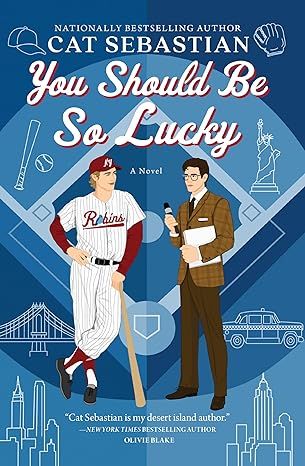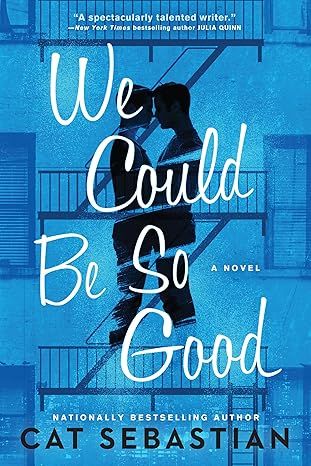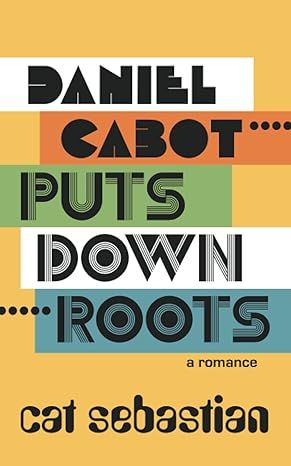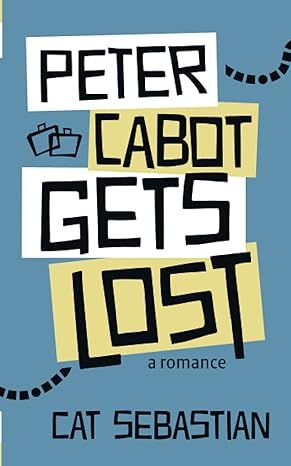You Should Be So Lucky: A Novel
4.7
-
853 ratings
An emotional, slow-burn, grumpy/sunshine, queer mid-century romance for fans of Evvie Drake Starts Over, about grief and found family, between the new star shortstop stuck in a batting slump and the reporter assigned to (reluctantly) cover his first season—set in the same universe as We Could Be So Good.
The 1960 baseball season is shaping up to be the worst year of Eddie O’Leary’s life. He can’t manage to hit the ball, his new teammates hate him, he’s living out of a suitcase, and he’s homesick. When the team’s owner orders him to give a bunch of interviews to some snobby reporter, he’s ready to call it quits. He can barely manage to behave himself for the length of a game, let alone an entire season. But he’s already on thin ice, so he has no choice but to agree.
Mark Bailey is not a sports reporter. He writes for the arts page, and these days he’s barely even managing to do that much. He’s had a rough year and just wants to be left alone in his too-empty apartment, mourning a partner he’d never been able to be public about. The last thing he needs is to spend a season writing about New York’s obnoxious new shortstop in a stunt to get the struggling newspaper more readers.
Isolated together within the crush of an anonymous city, these two lonely souls orbit each other as they slowly give in to the inevitable gravity of their attraction. But Mark has vowed that he’ll never be someone’s secret ever again, and Eddie can’t be out as a professional athlete. It’s just them against the world, and they’ll both have to decide if that’s enough.
Kindle
$8.99
Available instantly
Audiobook
$0.00
with membership trial
Paperback
$16.91
Audio CD
$31.27
Ships from
Amazon.com
Payment
Secure transaction
ISBN-10
0063272806
ISBN-13
978-0063272804
Print length
400 pages
Language
English
Publisher
Avon
Publication date
May 06, 2024
Dimensions
5.31 x 0.9 x 8 inches
Item weight
2.31 pounds
Frequently bought together
Popular Highlights in this book
Eddie is leading the National League in not noticing men in locker rooms.
Highlighted by 162 Kindle readers
Only two things in the world people count by months. How old a baby is, and how long since something awful happened.
Highlighted by 138 Kindle readers
Product details
ASIN :
B0CFM3SK19
File size :
4164 KB
Text-to-speech :
Enabled
Screen reader :
Supported
Enhanced typesetting :
Enabled
X-Ray :
Not Enabled
Word wise :
Enabled
Editorial reviews
"Cat Sebastian writes about love in all its forms with the care, warmth and effortless mastery of someone putting a homecooked meal in front of you. I don't know how she keeps getting better, or how she managed to make me care so much about a sport I know literally nothing about, but this one is--again!--the best yet. A truly wonderful and heart-healing romance about community, grief, perseverance, New York bakeries--and baseball." — Freya Marske, bestselling author of A Marvellous Light
"It's impossible not to be romantic about baseball in YOU SHOULD BE SO LUCKY. It's a book about second chances, the inevitability of failure, and the everyday miracle of finding--and deserving--love. As with all Cat Sebastian books, this one changed me irreversibly. For everyone who's ever had to come back from the worst thing they've ever imagined; for everyone who longs for life to be surprising and wonderful again. I never wanted to put this book down--I laughed, I sighed, I cried, and I know I will return to it many, many times." — Olivia Blake, NYT bestselling author of the Atlas series
“People think the ending is what defines a romance, and it does, but that’s not what a romance is for. The end is where you stop, but the journey is why you go. Whether we’re talking about love, baseball or life itself, Sebastian’s book bluntly scorns measuring success merely by end results… Hoping, loving are things you do for their own sake, to mark being a human among other humans... If you read one romance this spring, make it this one.” — New York Times Book Review
"Another wonderful read from Cat Sebastian. This book was like a big warm hug, with wonderful characters you can't help but root for. Mark and Eddie stole my heart within the first few pages, and their story of love and growth, especially in the face of grief, will be a sure hit with readers." — Emma Denny
"Sebastian’s latest is full of grumpy/sunshine goodness, with an absolutely delicious slow-burn romance." — Library Journal (starred review)
"Sebastian delivers another irresistible period romance in this poignant spin-off of We Could Be So Good... The pair’s endearing slow-burn romance, which plays out between ball games and on the Robins’ road trips, delivers a big emotional payoff. (“?‘I love you,’ Eddie says... ‘You’re a nightmare,’ Mark returns, in precisely the same tone of voice.”) Readers will melt." — Publishers Weekly (starred review)
“A delicious slow burn threaded with midcentury New York detail… Elegant character development and strong, witty writing make this one a home run… Another stunning queer historical romance from a writer at the top of her game.” — Kirkus Reviews (starred review)
"Sebastian delivers a home run of a romance that gracefully pivots from moments of sweet romantic yearning to sizzling sensual heat with perfect aplomb. Readers are so lucky to have books by the ridiculously talented Sebastian, who makes writing superbly satisfying love stories with wry wit and endless empathy seem effortless." — Booklist (starred review)
Read more
Sample
Part I
May
Chapter One
1960
After a year of doing basically nothing—although Lilian is forever clapping him on the shoulder and earnestly telling him that survival is something, it’s wonderful, darling, a testament to his strength—Mark Bailey finds that it’s a bit of a shock to the system to discover he’s in the middle of a meeting with his boss.
Sure, they’re in a grimy Irish bar instead of the Chronicle’s wood-paneled conference room, and they’re drinking watered-down gin instead of coffee, and nobody’s there to take notes or waste time by talking about golf, but it’s still a meeting no matter how Mark looks at it, God help him.
“So here’s the problem,” Andy says. Andy is—well, when he isn’t busy being Andrew Fleming III, the Chronicle’s publisher, he and Mark are friends, or whatever you call it when you’re both queer and work at the same place and keep one another’s secrets.
“We need to convert weekday commute readers to Sunday subscription readers,” Andy goes on. “The Sunday paper is where we make money.”
Mark’s been hearing versions of this for months. After three drinks, Andy’s capable of delivering an entire lecture, complete with pie charts drawn on the backs of cocktail napkins, about return on investment, dwindling ad sales, and how television will be the ruination of the free press. It’s all unspeakably boring, and the only reason Mark hasn’t put a stop to it is that it would take an awful lot of energy that he simply does not have.
“A new Sunday magazine is going to replace the old pullout supplement starting in July,” Andy goes on. “It’ll be glossy and in full color, and we want it to attract a different set of readers. I was looking at those articles you wrote a couple years back for Esquire and The New Yorker, and even some of the longer pieces you used to write for our arts and culture section. That’s exactly what I want.”
Andy’s being tactful by not saying something like “back when you used to do actual work instead of writing book reviews every few months for fifty-dollar checks that you forget to cash.” Technically, Mark resigned in February 1959 but never quite got out of the habit of coming in to work. This may be pushing the envelope on eccentricity, but he’s pretty sure that ship has sailed; he’s firmly in Miss Havisham territory now, haunting the dusty and half-empty fifth floor of the Chronicle building, an eldritch entity that junior reporters warn one another about.
“According to market research,” Andy goes on, “sports coverage is one of the top reasons people buy the paper, so I’m thinking the magazine needs stories with a sports angle.”
All this strikes Mark as exceptionally pie-in-the-sky; he’s not optimistic by nature and even less so where newspapers are concerned. If Andy didn’t look like a man about to ask a favor, he’d assume this had nothing to do with him. His magazine features were mostly profiles of architects and fashion designers. He hasn’t written a word about sports since he was on his high school newspaper, nursing an ill-fated crush on the quarterback.
Mark drains his gin and waves the bartender over for some more. “You need a highbrow sports feature for the magazine, and you want me to write it.”
“Yes,” says Andy, drawing out the syllable and looking at his drink instead of at Mark. “You know when a paper publishes a weekly diary by an athlete over the course of a season?”
Mark scoffs. “I don’t think any of those have ever actually been written by the ballplayer. It’s always some poor bastard in the sports department . . .” He trails off as Andy’s meaning makes its way through the haze of gin. “No. Absolutely not. I’m not ghostwriting a ballplayer diary. I can’t think of anyone on your entire staff less qualified.”
“Nonsense. You follow the game. You and Nick complain about the Yankees every time we see you, and I know you were pleased to hear about the Robins coming to New York, because you said so, in my own kitchen.”
Mark glares at Andy. Surely, using his own words against him counts as emotional blackmail. He and Nick have been paying attention to the trials and travails of the city’s new baseball team—Nick because he loves baseball, and Mark because he loves drama. But Mark doesn’t follow the game; a passing familiarity with baseball is something he caught, like the measles, not something he did on purpose.
“Why can’t you have one of the junior sportswriters do it? Or someone else who can be motivated by an extra ten dollars a week?”
Andy goes back to swirling the ice around in his glass. “Well, the player I was thinking of might need special treatment.”
“What player do you have in mind?”
“That new shortstop. O’Leary.”
“You think people want to read a diary by a guy who threw a tantrum in public after he was traded here? And who’s barely managed to hit the ball since then?” Mark cannot think of anything more likely to get someone to throw their paper directly into the nearest trash can.
“There has to be more to him than that,” Andy suggests.
“He called the manager a drunken psychopath, the team a bunch of talentless layabouts, and the owners a couple of debutantes.” Mark has seen these phrases printed in every paper he reads and has heard them repeated everywhere from the subway to the Chronicle break room.
Andy shrugs. “Is any of that wrong, though?”
Mark snorts. “Probably not,” he concedes. “There’s no way the Robins will let him within ten yards of a reporter.”
“They’re operating under the idea that any press is good press if it gets people to the stadium.”
“Still, it ought to be a sportswriter who does it.”
“Well, that’s the problem. Half the sports desk staff have publicly insulted O’Leary. The other half, well. Nobody’s going to believe O’Leary wrote this diary if it’s filled with aw-shucks earnestness. It would have to have an edge.”
“Andy,” Mark says, laughing despite himself. “Are you calling me mean?”
“No,” Andy protests. He’s a terrible liar. “Just—cynical, maybe. When you want to be. Anyway, writing the weekly diary would get you access to the team, which you can use to write the magazine feature. I’d like to run it the first Sunday in October. If you’re up to it, that is.” He’s offering Mark a graceful out, and Mark’s tempted to take it. “But with the magazine about to take over the fifth floor, it would be nice to have an excuse for you to keep that office.”
At the idea that he might lose his office, Mark feels a faint stirring of panic. Where would he go all day? Where, other than that office on the semi-deserted fifth floor of the Chronicle building, could he be allowed to hide away, spending what Lilian persists in calling the Best Years of His Life organizing paper clips by size and hoarding all the best pens?
The Chronicle—the familiarity of it all, from his typewriter with its sticky F to the people he sees in the elevator—has kept him afloat this past year. He has to get out of bed because he has to brush his teeth; he has to brush his teeth because he has to go to work. There’s a rhythm to his day that he doesn’t exactly enjoy, but at least it exists, and it carries him along until it’s the next morning and he does it all again.
That afternoon, when he unlocks his door, Lula lets out a single sharp bark, as if determined to let him know there’s another reason for Mark to get out of bed every morning, and that’s to be a wire-haired terrier’s indentured servant.
Mark leans down to scratch the dog’s head, and she gives him a sad look. I’m not angry, I’m just disappointed, she communicates with every bark, every look, every nap spent slumped against the door, waiting for someone who’s never going to come home. But honestly, it’s an unspeakable relief that the dog hasn’t moved on, either.
Everyone—well, the handful of people who actually know—has been telling him that eventually he’ll go back to normal, but after a year of this, Mark’s increasingly certain that everyone is full of shit. Or, more likely, they simply don’t understand, and good for them. Mark’s genuinely happy for them.
He slips Lula’s leash on and lets her drag him back outside. It’s warm and breezy, the sort of weather that makes people in the city flirt with the idea of sidewalk cafés and picnics, before remembering that exhaust fumes don’t go with most meals.
The dog leads him along the same route she’s taken for the entire eight years Mark’s known her: around the perimeter of Gramercy Park, then south on Irving Place with a pointed digging in of the heels in front of a bakery. “No, Lula,” he says, just like he always does. “We’re not going in today.”
Back at home, Lula takes up sentry by the kitchen cupboard that houses the dog food. It’s the stuff that comes in cans, which is both unreasonably expensive and unfathomably smelly, but that’s what William always bought, and it isn’t like Mark is about to ruin this poor animal’s life even further by purchasing substandard dog food. William raised Lula to have taste, and far be it from Mark to second-guess either of them.
The fact that he can calmly formulate that thought surely has to count for something. But it turns out that what’s on the other side of last year’s brittle fragility isn’t normal but something grayscale and hollowed out. Mark is . . . fine: he paid his taxes on time and he went to the dentist when his tooth hurt. He isn’t in any danger of throwing himself out of windows or acquiring interesting new habits of self-destruction.
It’s just that when he tries to figure out what the point is in getting out of bed every morning, he doesn’t have the answer. Even work—which had always been an answer, at least—feels flat and dull, like there’s nothing left in the world worth writing about. He’s made sure not to tell Lilian about this or she might get that terribly sad face again, and then he’ll have to endure her and Maureen having him over for dinner and relentless sympathy while the whole time they look at him like he’s the ghost of Christmas yet to come.
The dog barks, and Mark realizes he’s paused with his hand on the can opener. He opens the can and dumps its appalling contents into the little bowl with the dog bone painted inside that they picked up on vacation in Marseilles years ago.
He ought to do something about his own dinner, but instead he turns on the television with the half-formed intention of smugly watching a quiz show—he takes his thrills where he finds them, these days. The television is tuned in to a baseball game, though. The commentators are going on about how O’Leary’s been batting literally zero since getting traded. That’s almost impressively terrible. Hadn’t there been talk last season about him being rookie of the year?
Mark kneels in front of the television until O’Leary’s at bat. He knows from occasional glances at the sports page that Eddie O’Leary has been talked about as having the prettiest swing in baseball. What Mark sees today doesn’t have anything pretty about it. It is, frankly, a mess. It looks like it physically hurts, like O’Leary’s body is doing something it has no business even trying.
O’Leary strikes out and then—Mark winces—snaps the bat over his knee. What an absolute infant, having tantrums in public. Mark isn’t sure how much you can tell about someone’s demeanor from grainy black-and-white television footage, but O’Leary looks defeated as he returns to the dugout.
Mark spreads the Chronicle’s clippings on O’Leary across the dining room table in chronological order. They make a depressing tableau. You can almost hear the hushed, reverent awe with which reporters last spring talked about O’Leary’s future. By the fall, columnists who ought to know better were openly comparing him to Ted Williams and Joe DiMaggio, throwing around rookie-year stats and acting like starry-eyed children. When O’Leary went and started this season by batting .500 in the month of April, an embarrassing array of superlatives began appearing alongside his name.
He was good, Mark will give him that, no question. But what’s probably just as relevant is that he’s good-looking. He looks like he fell out of a Renaissance painting, all golden curls and blue eyes and excessive muscles. He really is very handsome, but in a way that feels obvious, like if you asked an artist with no imagination to draw you an attractive man.
And he’s white—that still matters, even a decade after most baseball teams integrated. There are plenty of people who of course aren’t prejudiced, how dare you suggest it, but who are demonstrably reassured by the existence of talented white athletes. Eddie O’Leary must have seemed like an answer to their bigoted little prayers.
Mark turns his attention to the final section of clippings, by far the most abundant, those dating since O’Leary’s early season trade from the Kansas City Athletics to the Robins. Mark knows what happened—everyone who pays even casual attention to New York sports knows what happened. News of the trade broke toward the end of a game; O’Leary, when informed by an opportunistic reporter in the locker room, proceeded to insult everyone on his new team. It’s bad luck that television cameras were in the locker room, but that’s all the more reason for O’Leary to have made an effort to control himself. He had to know that once the cameras picked up on his tirade, the newspapers would have no choice but to write about it, however loath sportswriters usually are to tarnish the heroes their readers demand.
Mark has little patience for people who can’t muster up a minimum degree of self-control. They’re spoiled children. Most people would be arrested, beaten, fired, or disowned if they didn’t keep a tight leash on their emotions and reactions, but the Eddie O’Learys of the world think they can do whatever they please.
But a stray phrase catches his eye, something from a Kansas City paper—whoever’s in charge of news clippings at the Chronicle has made a thorough job of it. It’s the beginning of O’Leary’s rant—or, rather, what preceded it. “That can’t be,” O’Leary told the reporter who had broken the news to him. “That can’t be right.”
Mark reads the rest of the article. O’Leary shared a house with three teammates, and every few weeks his widowed mother drove out from Omaha to see her only child play.
That can’t be now seems to carry a decisively mournful note. O’Leary was having his life uprooted, his life as he knew it taken away, and it was happening on television.
Mark is being, he realizes with a shudder, soft-hearted—an alarming new tendency. The other day he found himself looking charitably upon the hellion upstairs whose violin practice used to make him long for the quiet of the grave. Whatever cracks in his psyche the past year left in its wake, there’s plenty of room now for this sort of thing to creep in.
Still, though. This is an angle for the magazine feature Andy wants. A broken-hearted Eddie O’Leary whose game fell apart at the same time his life fell apart is a far fresher story than a badly behaved child who isn’t playing his best for the straightforward reason that he resents his luckless new team; there are six of those articles sitting right now on his dining room table. And Mark remembers the palpable sense of doom that O’Leary had radiated, even through a television screen. The idea that this kid is grieving isn’t entirely in Mark’s head, even if O’Leary is a spoiled brat. On any other team, he’d be on his way to the minors to endure this slump in relative private, but the Robins are bad enough that one more lousy hitter won’t make a difference. Whatever happens to O’Leary is going to happen in front of the nation’s largest television market.
It occurs to Mark that what he’s witnessing is a disaster. This is a shipwreck, a funeral pyre, a crumbling ruin. What’s happening to Eddie O’Leary is an end. That’s something Mark knows about; that’s something Mark can write about.
Read more
About the authors
Cat Sebastian
Cat writes queer historical romance. In her spare time she acquires too many houseplants and misplaces things. She lives in a swampy part of the American south but also on twitter.
Visit Cat at CatSebastian.com
Reviews
Customer reviews
4.7 out of 5
853 global ratings
Maxmax
5
Came for the slash, stayed for the rest! ⭐️⭐️⭐️⭐️⭐️
Reviewed in the United States on August 2, 2024
Verified Purchase
I’ve been voraciously reading Cat Sebastian’s novels forever and it’s amazing to see them get better and better. You Should Be So Lucky made me so invested in baseball even when I knew nothing about it.
The romance is immaculate but beyond that, the characters are so alive, 3D and human, you’re rooting for them all the way. There’s grit and resilience triumphing over failure, there’s hope after terrible grieving over losing loved ones (yes, there were tears).
The only awful thing about the book was reading the last page and there were no more pages after that.
Read more
Megan H
5
a witch?
Reviewed in the United States on June 19, 2024
Verified Purchase
How does Cat Sebastian make me feel SO many things??? How is this book about nothing and also everything??? Truly a wonder. I loved this so much. I loved the baseball, the writing, the phone calls, the Mark, and the Eddie. Just a steady and warm hug of a book (eventually. It’s definitely sad at first).
Manden
5
Charming, Touching, Funny, and Profound!
Reviewed in the United States on August 4, 2024
Verified Purchase
This book is just so brimming with humanity. All the things in life; the challenges, the successes… what really matters is being true and being happy. Especially when being true is in many ways not possible, where being erased is a fact of life. The story is complex, but simple. Quietly eviscerating of the inequities. But also celebrates all the beauty in life. The story is constantly showing how much was denied, but also how much these people had, could have, anyway. And what matters and what doesn’t. And how sometimes what is missing can be a blessing. Heartwarming while acknowledging all that is depressing - treating each person and situation with gentle grace. Charming, so charming. Funny. So much is so, so profound. About so many things - crushing grief, authenticity, happiness, the weight and impossibility in hiding. This book continuously surprised me with the seriousness and lightness of characters and arcs and stories. There were multiple times throughout where I thought to myself, “this here is perfect”, with similarities in that balance and those perfect moments to Ted Lasso.
Read more
Amanda Gates
5
Beautiful and moving love story!
Reviewed in the United States on May 24, 2024
Verified Purchase
Cat Sebastian is the queen of my heart! I’m a puddle of goo for her midcentury boys, and Mark and Eddie are no exception.
We met Mark Bailey in We Could Be So Good, he works at the paper and persisted in gifting Nick with queer literature. When we begin his story, he’s deep in mourning for his late boyfriend - withdrawn from life, he has mostly quit his job but still lurks around the office. One day Andy gets the idea to send him to do a weekly feature on Eddie O’Leary, a baseball player deep in both a PR scandal and a batting slump. Both men are in crisis, and they find unexpected kinship in one another.
I adore the unique grumpy x sunshine dynamic these two have! Mark is prickly and biting, but essentially kind. And while Eddie is sunny and easygoing for the most part, he has a hell of a temper. Watching them learn to support and trust one another was completely lovely. The writing is as immersive as always, expertly building this world of dreamers and lovers in a time when to be true to themselves was a jail sentence.
As with her other books, these are what I’d call cracked door spice, but the emotional impact is weighty and the tension delicious. Every moment and character carries significance to the story, and I can’t get enough of these journeys. I recommend this for anyone, but fans of sports romance, historical, and/or Cat Sebastian won’t be disappointed!
(This one also frequently references one of my favorite authors of all time, Shirley Jackson, so that was a delight!)
Read more
Kevin Co
5
An MM period romance that is full of queer joy
Reviewed in the United States on May 30, 2024
Verified Purchase
You Should Be So Lucky is a historical 1960s gay romance between a newspaper columnist and a baseball player. Mark Bailey is still reeling from the loss of his lover when he is assigned to write a series of articles about the new hotheaded rookie pitcher. Eddie O’Leary is in a slump after being transferred from his old team to New York where he is being shunned by his new team who he very publicly maligned them. These two lonely men find companionship with each other and struggle to keep things professional.
This book was just so cute, so adorable, and so charming I couldn’t help but smile throughout. It’s low angst, low conflict, and just a cozy slow-burn romance with no third act break up. I could not ask for more. Is it perhaps too idealistic and optimistic? Yes, but I welcome this pure queer joy.
I know next to nothing about baseball, but it did not matter because these two men just had me completely on their side from the get go. Mark learns to love again and accept the love that is given to him despite the many seemingly valid reasons against it because sometimes love isn’t logical. Eddie learns that life and love isn’t always perfect, but that doesn’t mean he can’t still live and love in an imperfect world. They exemplify the grumpy+sunshine, rottweiller+golden retriever tropes to perfection.
You Should Be So Lucky delivers another period romance full of queer joy.
Read more
Top Cat Sebastian titles
View allSimilar Books
Best Sellers
View all
The Tuscan Child
4.2
-
100,022
$8.39

The Thursday Murder Club: A Novel (A Thursday Murder Club Mystery)
4.3
-
155,575
$6.33

Sapiens: A Brief History of Humankind
4.6
-
140,302
$13.49

The Butterfly Garden (The Collector, 1)
4.3
-
88,556
$9.59

Things We Hide from the Light (Knockemout Series, 2)
4.4
-
94,890
$11.66

The Last Thing He Told Me: A Novel
4.3
-
154,085
$2.99

The Perfect Marriage: A Completely Gripping Psychological Suspense
4.3
-
143,196
$9.47

The Coworker
4.1
-
80,003
$13.48

First Lie Wins: A Novel (Random House Large Print)
4.3
-
54,062
$14.99

Mile High (Windy City Series Book 1)
4.4
-
59,745
$16.19

Layla
4.2
-
107,613
$8.99

The Locked Door
4.4
-
94,673
$8.53










